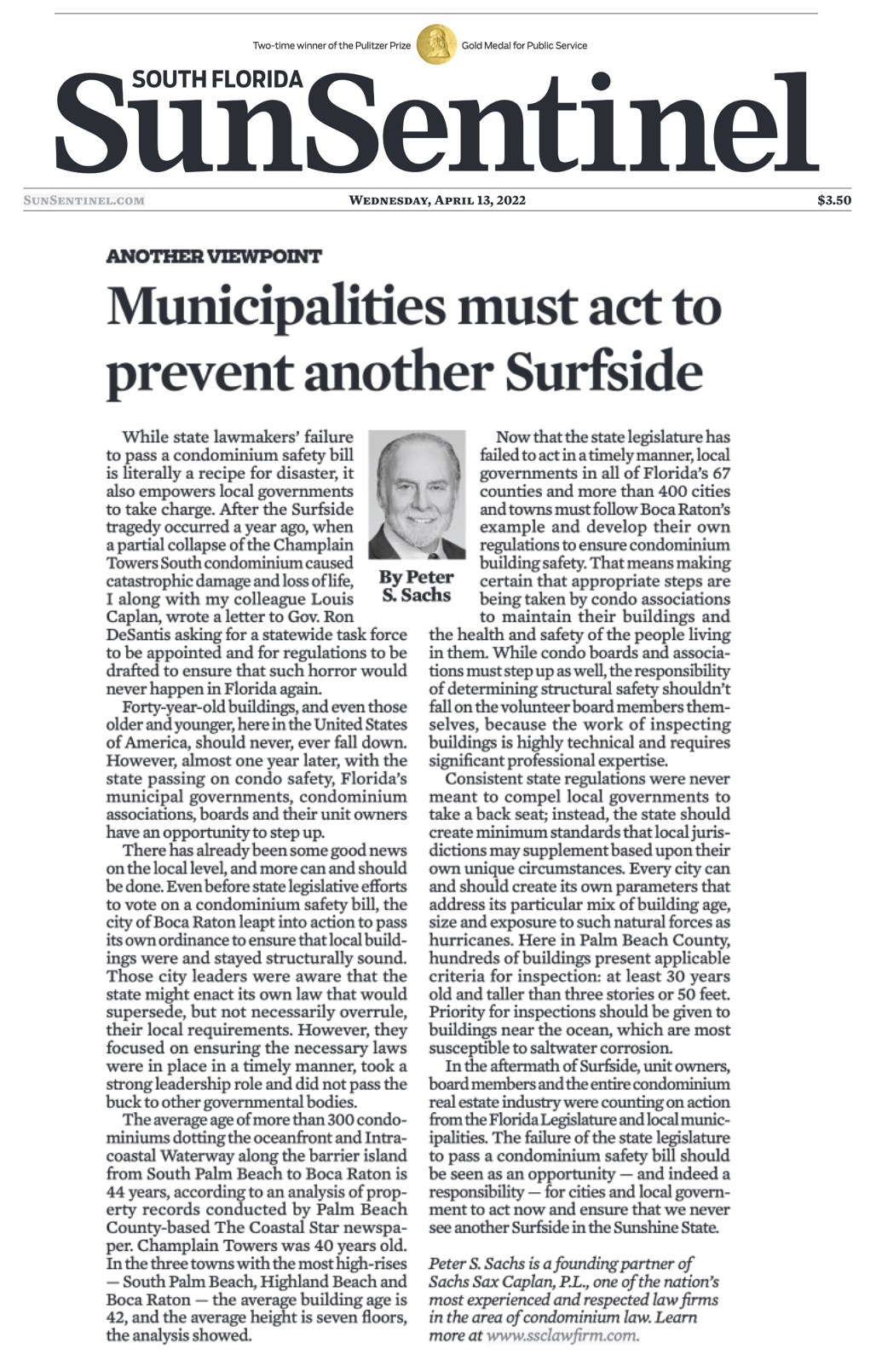
The Sun Sentinel featured founding partner Peter S. Sachs as he calls on municipalities to prevent another surfside disaster Read more below


The Sun Sentinel featured founding partner Peter S. Sachs as he calls on municipalities to prevent another surfside disaster Read more below
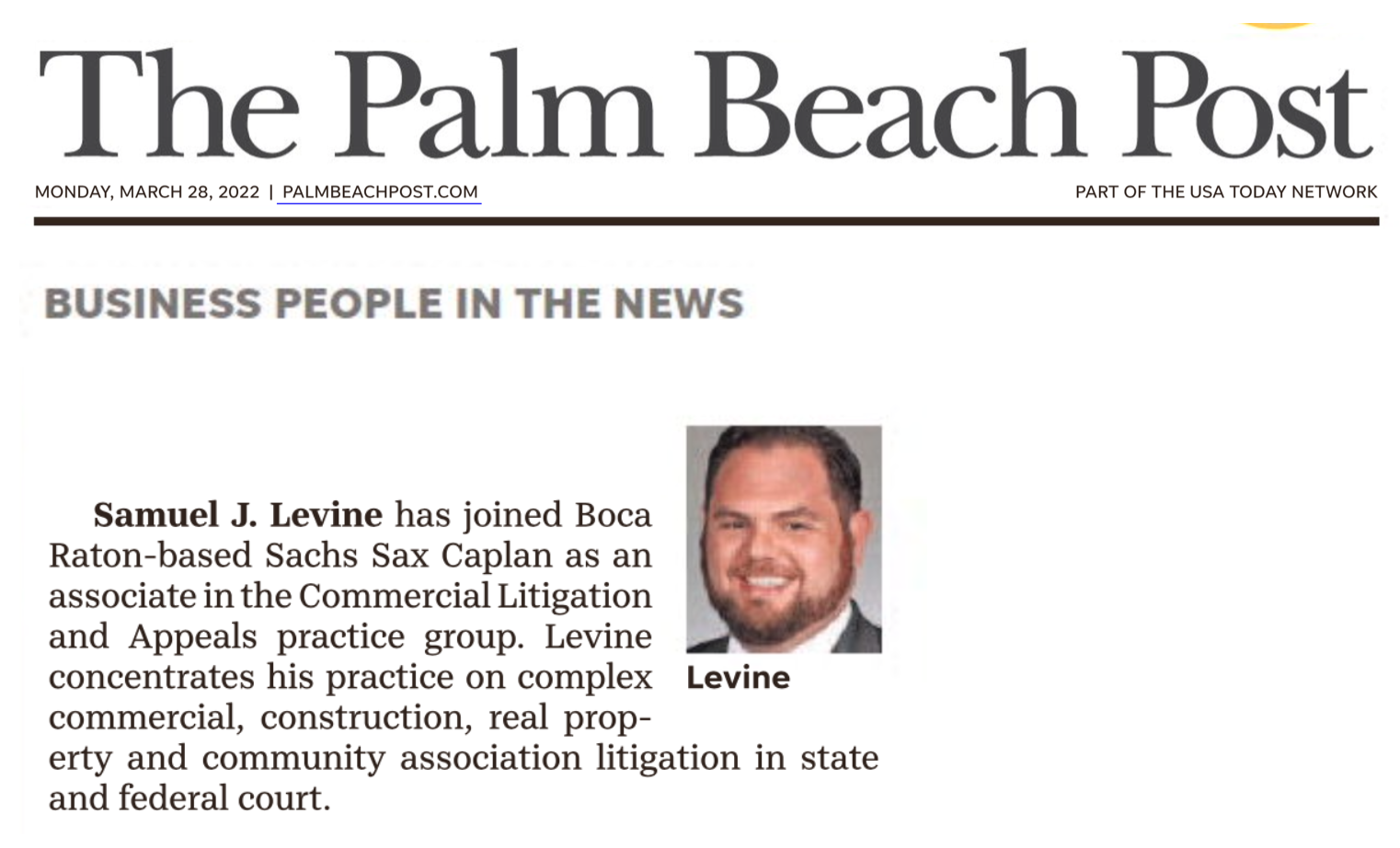
Samuel J. Levine was featured in the The Palm Beach Post as a new associate at Sachs, Sax and Caplan. Learn more about Samuel including how to work with him here: https://ssclawfirm.com/samuel-levine?view=employee&id=45
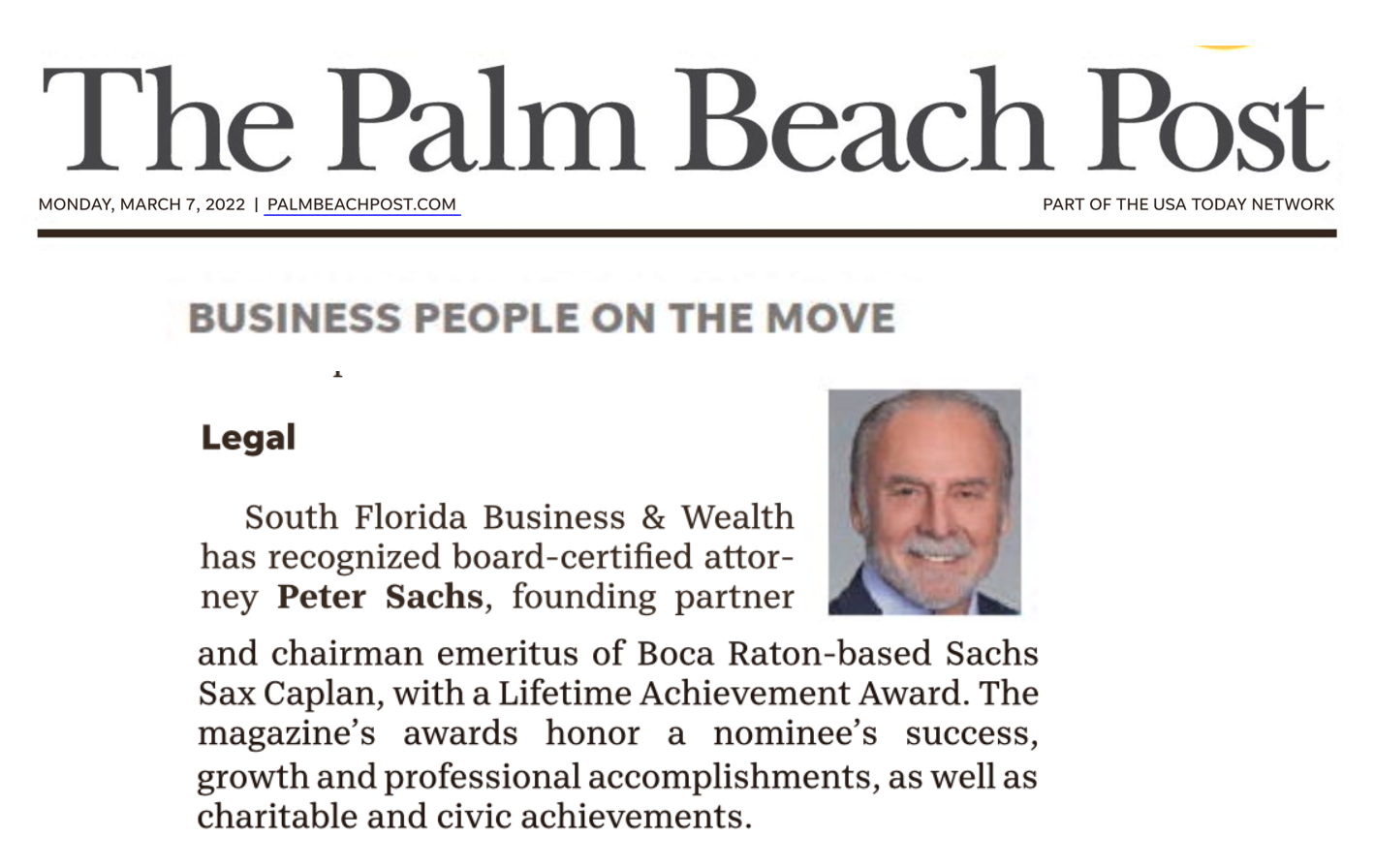
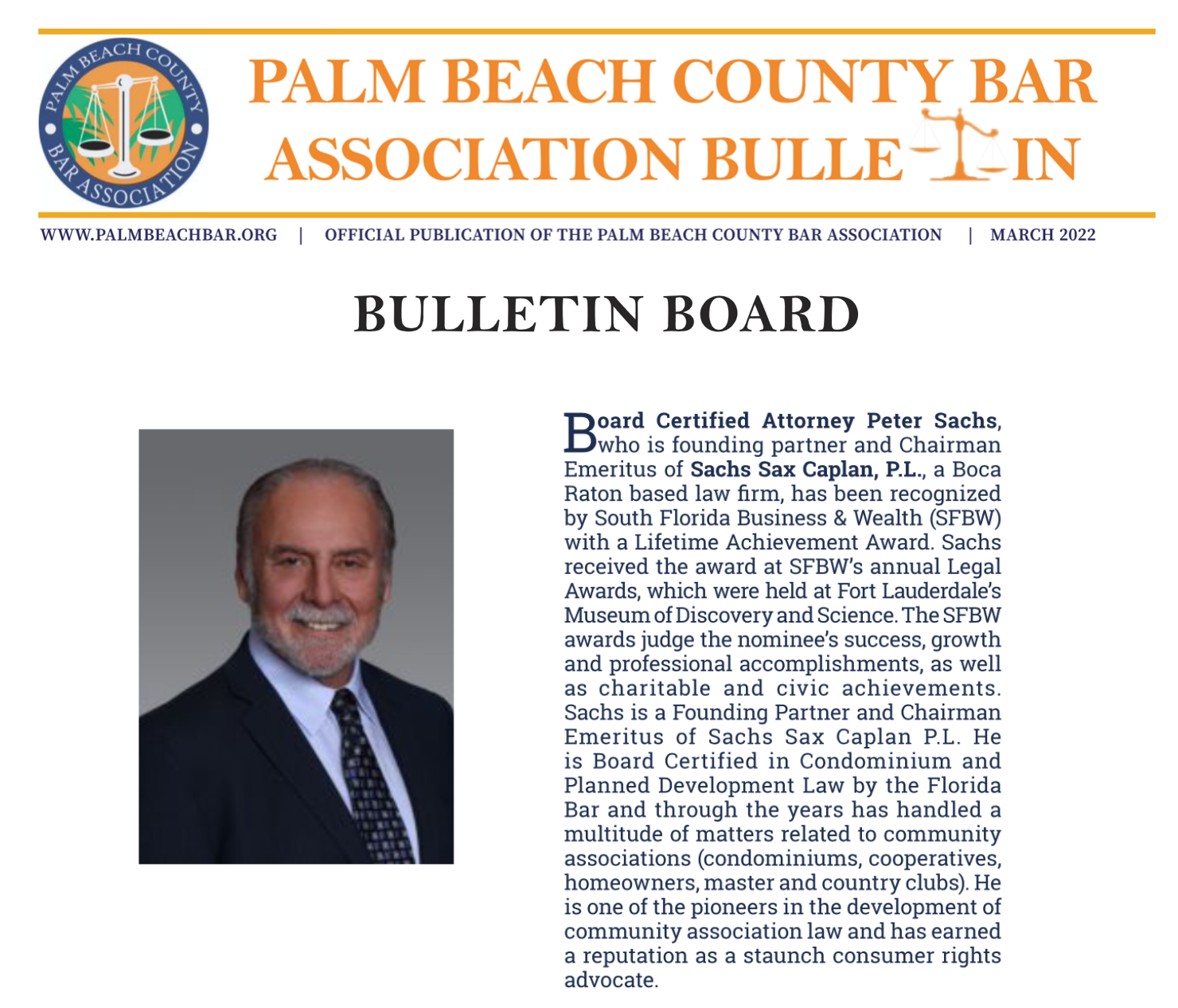
Peter Sachs, founding partner and chairman emeritus was recognized by The Palm Beach Post and Palm Beach County Bar Association Bulletin.
Meet the four new attorneys and the rest of our experienced team https://ssclawfirm.com/experienced-attorneys
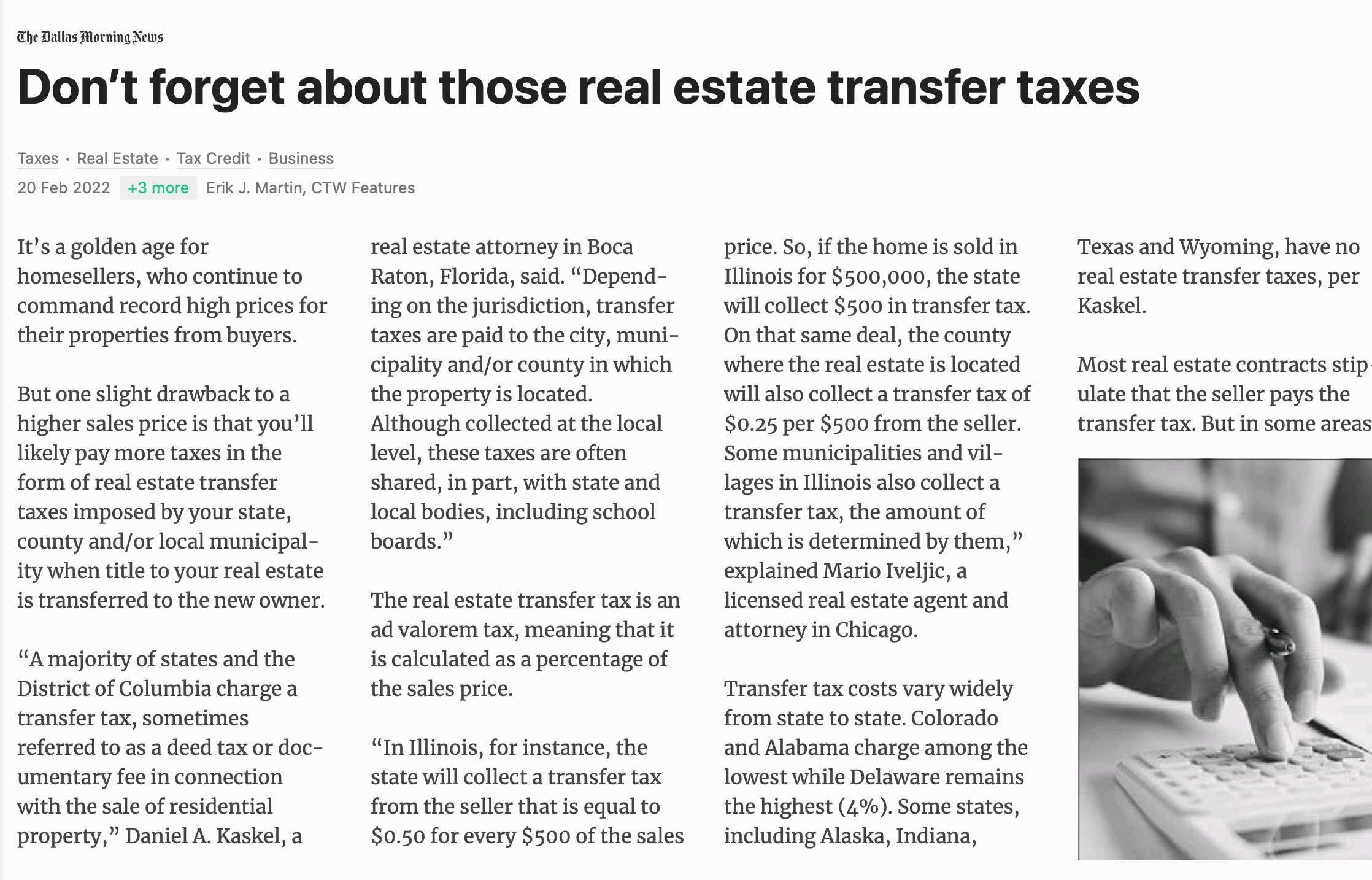
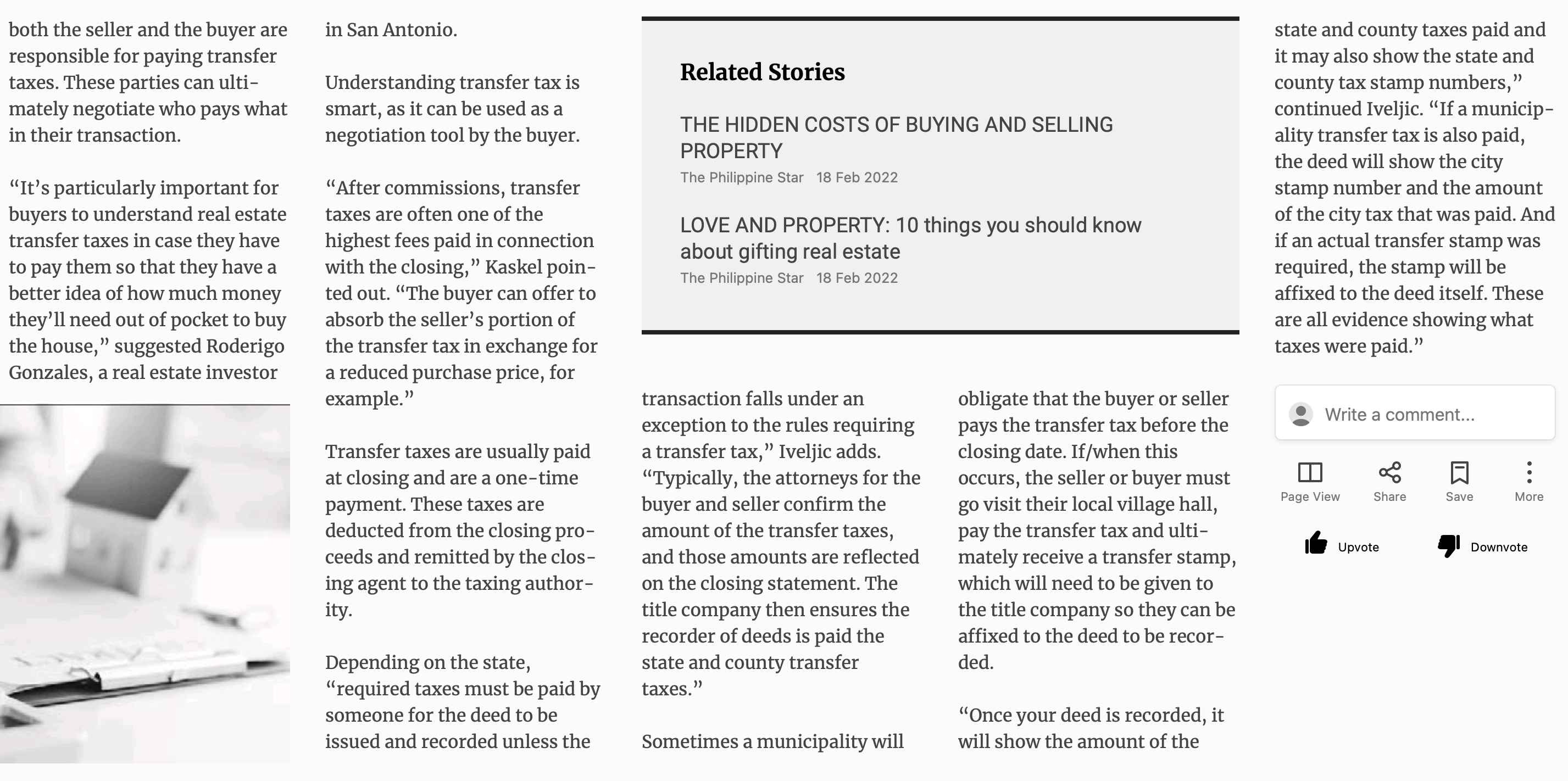
Attorney Daniel Kaskel discusses transfer taxes with the Dallas Morning News. Read more below on what you need to know when selling your property.
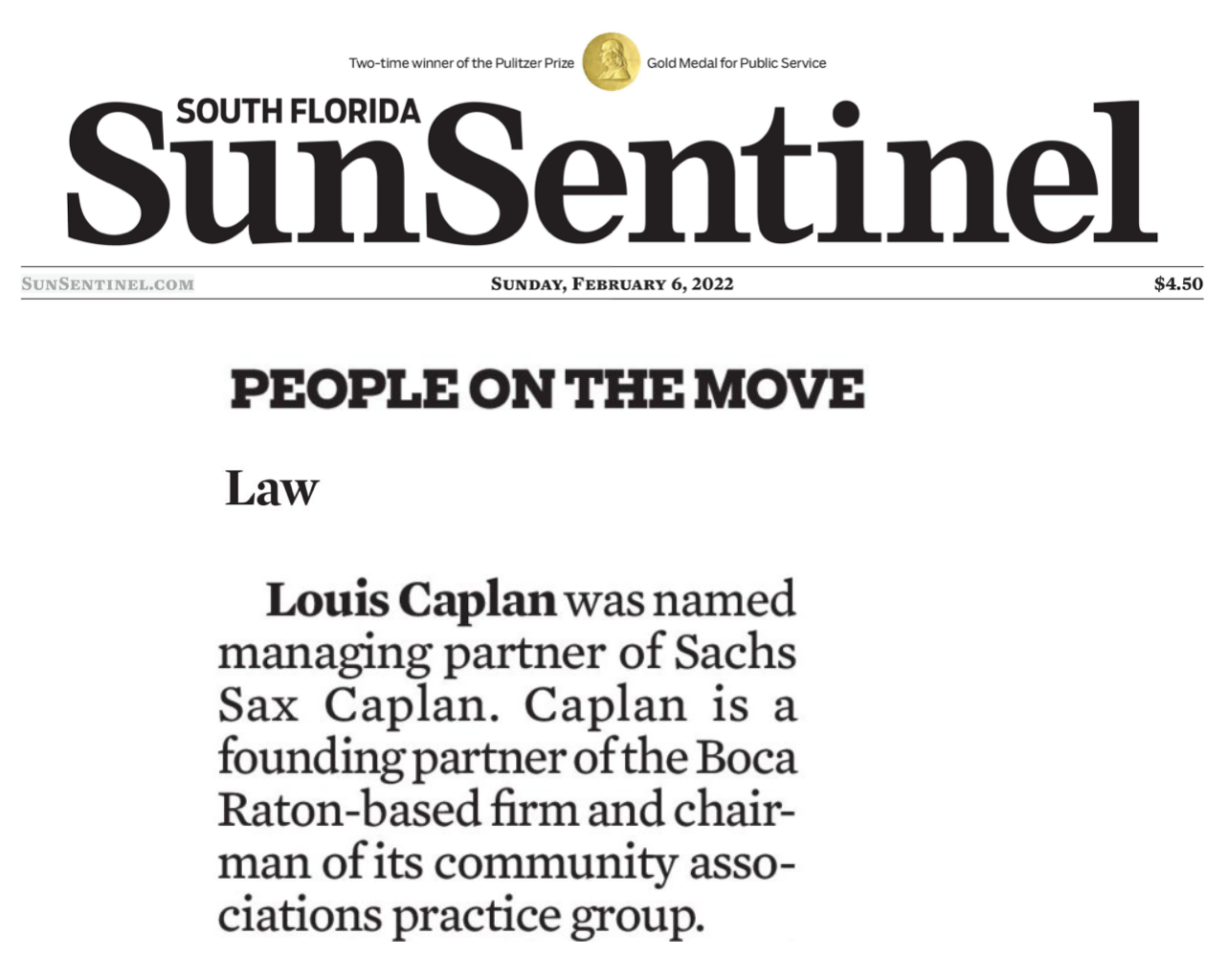
Louis Caplan was featured in the Sun Sentinel as the new managing partner of Sachs, Sax and Caplan. Learn more about Louis including how to work with him here: https://ssclawfirm.com/louis-caplan?view=employee&id=4
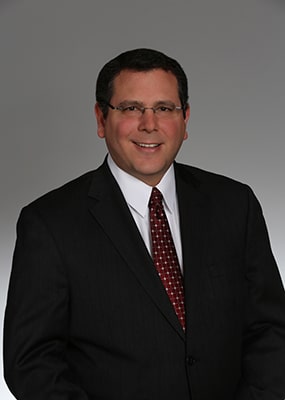
With the 2022 legislative session ending on March 11, very few pending association-related bills were passed this year. However, one very important bill relating to tree removal for community associations was passed through both houses and now awaits the governor’s signature. This bill, if signed into law, will have a very adverse effect on condominium and homeowners associations. As many may recall, in previous sessions, the legislature enacted a law to provide that a local government, such as a city or county, may not require applications, permits or other approval processes for the pruning, trimming or removal of a tree on “residential property” if the owner of the property (i.e., association) provides documentation from an arborist or licensed landscape architect that the tree presents a danger to persons or property. Many associations have been operating under the premise that this law would allow a community association to remove or otherwise deal with dangerous trees in the common areas, such as street trees, that pose a danger to the community and would allow the association to deal with these trees without having to go through the extensive permitting and approval process through the applicable cities or counties. In fact, recently, Palm Beach County issued a clarification specifically interpreting the existing law to provide that “residential property” includes association common areas and would allow associations to remove trees without going through the cumbersome permitting and approval process. However, the pending bill that is awaiting the governor’s signature would reverse this position in a way that would negatively affect community associations. The pending legislation specifically defines “residential property” to mean a single family or detached building located on a lot used for single family residential purposes. Therefore, under the new law, if it were to go into effect, it would become clear that trees located in the association’s common property would not be allowed this exception and would have to go through the applicable permitting and approval process with the city and/or county in which the tree is located. We understand that several groups that advocate on behalf of community associations are currently lobbying...

As a land use lawyer, I'm the one who usually deals with the tough stuff after the purchase of a property, the kind of real estate law that people who aren’t in the business really do not need to know unless it happens to them. But I want to discuss something else with you – let’s talk about how it is that you find and relocate your family to Florida ---without having to see someone like me later. And, trust me, it would be great to not have to see me. If you're relocating to South Florida, probably the first thing on your mind is a house for you and your family. And of course, the name, Boca Raton comes to mind. But you'll soon find out that just like where you came from, you're relocating to a region, and that region is probably somewhere between Fort Lauderdale and West Palm Beach. And there are all sorts of little neighborhoods, and all sorts of little niches to consider for your family home. If you have children, the first thing you're going to be thinking about, of course, is schools – and you'll take your own deep dive into that. However, if you're a couple, the first thing you're probably thinking about is amenities – country clubs, golf courses, tennis, etc. Or if you’re more prone to go out and about as your leisure time activity, you may be thinking about the small towns that are dotted along the ocean, the towns that provide for walking streets, restaurants, and nightlife. In any case, once you have narrowed it down and you determine what it is that you want, you're going to be in the South Florida System for buying a house. What is that the South Florida System? Initially, you're going to see is a lot of pretty pictures and a lot of broad smiles. But let’s go beyond that. As I've said, the unfortunate thing is, you might see a person like me if you don't make the right choices. So, let's talk about some of those things that are going...
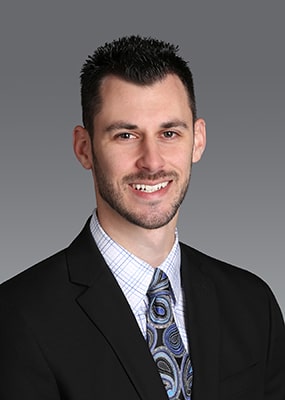
As a Community Association attorney, one of the unintended benefits that we've seen through COVID is the ability for people to participate in their community associations remotely. Typically, one of the impediments that community associations have historically faced is apathy. There are always those folks who don't show up, therefore you can't get anything done simply due to a lack of participation. However, through COVID, once everything went remote, including association operations, people started to participate more, which allowed for the opportunity for associations to start proposing a number of important things that could realistically get passed. One of the mechanisms we've seen an uptick in is the use electronic voting resolutions to allow people to participate and vote in an electronic fashion. Again, this removes some of the apathy because there's no longer the need to show up at a meeting at a certain time to cast a vote. People can do it at their leisure in advance. Overall, as community association lawyers, we've found that participation as a whole through COVID, and now turning the corner post COVID, has seen a significant uptick and is finally allowing associations to actually get meaningful work done that before this, they just simply were unable to do. Having Trouble Engaging Homeowners in Your Community Association? Check out these helpful tips from community association management giant, GrandManors: 1. Welcome New Homeowners. A welcome package from the community association should include a letter of welcome that you or another HOA board member has signed, information about how they can get involved in the HOA, and a small gift. The gift should have a connection to your community, such as a gift card to a nearby coffee shop, a refrigerator magnet with key community information, or a coffee mug with the HOA logo. 2. Organize Social Events. Consistently, studies have shown most Americans don't know their neighbors. Your homeowners have more motivation to get involved if they're at least acquainted with their neighbors. Your association can foster social connections by hosting at least one community-wide social event each year. Some associations throw a holiday party or a summer picnic....

As community association attorneys, one of the problems we face quite often with our association clients is how to prevent violations of the governing documents and rules of the communities. How do we prevent the homeowner from painting their house pink? How do we prevent people from hanging towels outside on the common element rails and doing other things that really are violations of the rules and regulations and the governing documents? And what a lot of board members and managers don't realize is that associations are sort of mini-democracies. What does that mean, exactly? There's a certain level of “due process” that associations must follow if they're going to fine somebody or if they're going to suspend somebody’s right to use the pool, or their right to use the tennis court. And one of the things that's common among both the Condominium Act and the Homeowners Association Act, is the fact that an association must establish a committee of non-board member owners who will hear complaints that the board has imposed regarding violations of the governing documents. This group serves as an independent body that decides whether they're going to uphold or approve the board's actions and decisions in relation to imposing fines and suspensions. Furthermore, both Acts require that the owner who was in violation and subject to a board-levied fine or suspension be provided with at least 14 days’ notice as well as the opportunity to be heard before this committee to present their case. This gives the person in violation a chance to present their opinion and present their evidence of why they think that the fine and the suspension should not be imposed. Only then, when it's all said and done, can the committee ultimately decide whether to approve or reject the fine or suspension. What we often face as association lawyers are situations where perhaps that procedure wasn't followed, where a board or managers just decided that this person violated the governing documents, and the violating party all of a sudden has a $1,000 fine on their account. When they come to us to try...
"Invest: Palm Beach 2021," which provides an in-depth review of the key issues facing Palm Beach County’s economy, was recently released earlier this year. The report features the exclusive insight of prominent business and political leaders who provide an in-depth look at what makes the region’s economy tick and the challenges that remain. Our own Founding Partner Spencer Sax is featured as a leading legal voice: “We are bullish on Palm Beach County and its legal sector. We knew baby boomers were going to retire and we knew that was going to be good for the economy, for the real estate market and for the legal market but COVID has really sped that up. The success of our national economy has afforded people the opportunity to buy second homes and it has also accelerated the move of people from out of state to our state. The more people and businesses move to Palm Beach County, the more need there will be for legal services. We were bullish about that trend even before the pandemic.” Want to know more about Palm Beach County? Here are some interesting facts our legal services team in Palm Beach County found: Palm Beach County by the Numbers from Discover the Palm Beaches: Two Downtown Convention Districts, each with 1,000 walkable hotel rooms350,000 sq. ft. of Convention Center space78 degrees average year-round temperature17,000 guest rooms county wide200+ hotel rooms county wideTwo accessible railways, high speed and regional routesThree miles from Palm Beach International Airport to the Palm Beach County Convention Center20 miles from Fort Lauderdale International Airport to the Boca Raton CityWide Collection3,200+ restaurants200+ cultural institutionsLargest hotel meeting space: 146,000 sq. ft.160 golf courses15+ resort-style hotels2 James Beard award-winning chefs Palm Beach County Interesting Facts and Figures from Palm Beach County’s Official Government Website: County History A U.S. Army fort built in Jupiter in 1838 is believed to be the first permanent non-Native American settlement in the area. The fort was followed by the first civilian residents who cared for the Jupiter Lighthouse beginning in 1860.In the late 1800s, the Jupiter and Lake Worth Celestial Railroad and Henry...
Board Certified Attorney Peter Sachs, who is founding partner and Chairman Emeritus of Sachs Sax Caplan, P.L., a Boca Raton based law firm, has been recognized by South Florida Business & Wealth (SFBW) with a Lifetime Achievement Award. Sachs received the award at SFBW’s annual Legal Awards, which were held at Fort Lauderdale’s Museum of Discovery and Science. The SFBW awards judge the nominee’s success, growth and professional accomplishments, as well as charitable and civic achievements.“As a child of survivors born in a refugee camp in Berlin, it was the goal of my parents to make sure I received a good education that had been denied to them,” said Sachs. “After graduating from Queens College, CUNY, performing military service and then graduating cum laude from Fordham Law School, I wanted to use my education and the opportunity it provided to help protect the freedoms and individual rights we enjoy in the best country in the world – the USA.” "As a child of survivors born in a refugee camp in Berlin, it was the goal of my parents to make sure I received a good education that had been denied to them” - Peter Sachs of Sachs Sax Caplan, P.L. Sachs is a Founding Partner and Chairman Emeritus of Sachs Sax Caplan P.L. He is Board Certified in Condominium and Planned Development Law by the Florida Bar and through the years has handled a multitude of matters related to community associations (condominiums, cooperatives, homeowners, master and country clubs). He is one of the pioneers in the development of community association law and has earned a reputation as a staunch consumer rights advocate.Sachs received his B.A. from Queens College of the City University of New York and his J.D. from Fordham University School of Law. Sachs is Past Chair of the 15th Circuit Judicial Nominating Commission, Past President of the South Palm Beach County Bar Association, and a Past Member of the Board of Governors of The Florida Bar.He was a Gubernatorial Appointee to the Treasure Coast Regional Planning Council; Past President and Gubernatorial Appointee to the Florida Independent Living Council; Past Board...
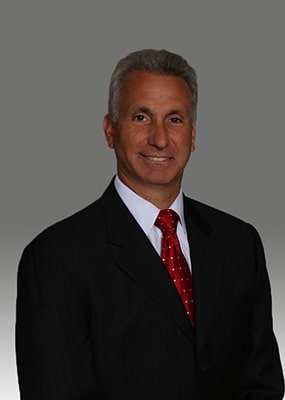
It has never been more challenging to be a board member in a condominium or homeowners association than it is at this time. Association board members in this voluntary position are being interacted by Association Members everywhere they go. In the hallway, at the pool, in the elevator, and everywhere else in the community, they’re being asked board questions and association questions by unit owners - possibly whom they’ve never even met. Aside from the usual worrying about maintenance, assessments and other items, we are now dealing with a pandemic as well - a pandemic that has created a plethora of new issues that we weren’t necessarily expecting. Covid-19 has created a situation where owners are spending more time in their homes, which means more time reviewing their property and its structure. Furthermore, homeowners’ association meetings are now often conducted on Zoom. Therefore, people who otherwise may have rarely shown up and been involved are regularly dropping in live from the comfort of their living room. As an Association attorney, I have clients come to me because newly interested owners are challenging them and their board members. They're challenging the appearance of their community. They're challenging the assessments they're paying, and they're challenging their rights, which sometimes have to be taken away for health, safety and welfare purposes. How do board members overcome or live with these challenges? As Association board members, you have to understand now more than ever, that you are board members when you interact at a meeting with other board members. When you’re walking around the halls or when you are at the pool, you are not a board member. You are not conducting board business, therefore you don't have an obligation to respond to these questions. However, I know that is not a great answer, because unit owners expect answers. So,one of the things I instruct our board members to do is to tell any and all unit owners, “That’s a very important concern, please put it in writing, submit it to our property manager, and we'll take it up at the next board meeting.” That...

Sachs Sax Caplan, P.L. is proud to be recognized by The Florida Bar for our commitment to hiring and developing Board Certified Attorneys.